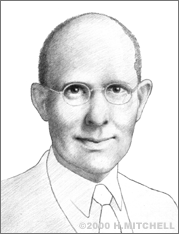Charles Kettering
Charles Franklin Kettering invented dozens of important devices, but he is best known as the founder of Delco, the company who brought automobiles into the Age of Electricity.
Kettering was born on a farm outside Loudenville, Ohio in 1876. With the first money he ever earned, $14 for cutting wheat on a nearby farm, he bought a telephone, which he soon dismantled, analyzed, and rebuilt. After graduating from high school, he taught in a one-room schoolhouse near his home. He entered college twice, in 1896 and 1898, but both times, he had to return to teaching because constant studying was ruining his eyesight. Then, Kettering worked on a telephone line crew, which gave him both the practical training on which he would rely as an inventor and the determination to earn a college degree. Kettering stayed after beginning college for the third time at Ohio State University and earned his BS in Electrical Engineering in 1904.
Kettering’s first post-collegiate position was with National Cash Register (NCR) in Dayton, Ohio. At that time, electricity was beginning to transform industry, in both the means of production and the types of goods produced. Kettering rose to the occasion, quickly earning a reputation as an innovator. In his five years at NCR, Kettering’s inventions included an electric motor for cash registers and the “OK” charge telephone for department stores and other public locations.
In 1909, Kettering and an NCR colleague left to form their own industrial research firm, Dayton Engineering Laboratories Company, soon known as Delco. The firm’s mission was to improve the automobile with electrical systems. Within three years, Kettering and his colleagues had designed and built all-electric starting, ignition, and lighting systems for automobiles. This meant, among other things, that cars no longer needed to be started with the help of a hand-crank connected to the engine. This was an obvious improvement in any case, which has been credited with giving women the independence to drive by themselves.
Kettering’s electric systems were first installed in the 1912 Cadillac, but they soon spread to other models. General Motors was so impressed that it bought out Delco and made it the basis of the GM Research Corporation. Kettering moved to Flint, Michigan to become Vice President of this new corporation and acquired the nickname “Boss Ket” as he oversaw a series of further automotive innovations. At the same time, Kettering (still a teacher at heart) was the driving force behind the creation of a college-level engineering school based in “practical education,” that is, training in which “the theory should supplement the practice and not precede it.”
Kettering gave a talk to the local YMCA in Flint, Michigan in 1916, which inspired its Industrial Committee to create a School of Automotive Trades for factory workers. This developed into the Flint Institute of Technology (1919) and General Motors Institute (1926). The core of these schools’ curriculum was the hands-on experience gained in laboratories and especially cooperative programs.
As an officer of GM and a supporter of GMI, Kettering continued to practice as well as to preach. His later automotive inventions included improvements to diesel engines and ancillary items like Duco™ paint and ethyl gasoline. Many of the well over 300 U.S. patent applications in his archives extend far beyond the automotive industry. Kettering invented portable lighting systems for farms, refrigeration coolants, and even solar energy apparatus. His medical inventions include an incubator for premature infants, a treatment for venereal disease, and prototypical magnetic diagnostic devices.
Kettering retired from GM Research in 1947, but continued to serve as its consultant until his death in 1958. He also founded the Kettering Foundation, a foundation devoted to “researching the relationship between democracy and the public.” In acknowledgement of his rags-to-riches life story, he was elected a Member of the Horatio Alger Association. His greatest honor came in 1998, when General Motors Institute was renamed Kettering University after “one of the century’s greatest inventors.”


